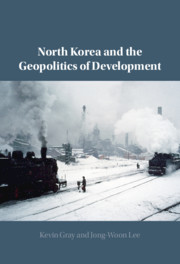Refine search
Actions for selected content:
4 results

North Korea and the Geopolitics of Development
-
- Published online:
- 10 September 2021
- Print publication:
- 15 April 2021
2 - Post-War Reconstruction and Catch-Up Industrialisation
-
- Book:
- North Korea and the Geopolitics of Development
- Published online:
- 10 September 2021
- Print publication:
- 15 April 2021, pp 58-85
-
- Chapter
- Export citation
3 - Geopolitical Contestation and the Challenge to North Korean Development
-
- Book:
- North Korea and the Geopolitics of Development
- Published online:
- 10 September 2021
- Print publication:
- 15 April 2021, pp 86-111
-
- Chapter
- Export citation
1 - State-Building and Late Development in North Korea
-
- Book:
- North Korea and the Geopolitics of Development
- Published online:
- 10 September 2021
- Print publication:
- 15 April 2021, pp 31-57
-
- Chapter
- Export citation
